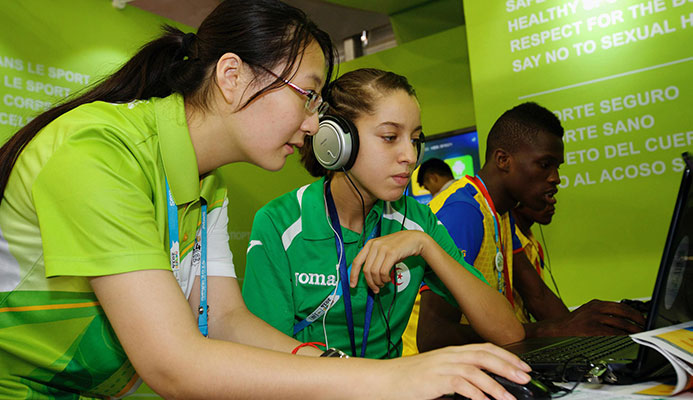WITH INTERNATIONAL YOUTH DAY 2018 ON 12 AUGUST FOCUSING ON #SAFESPACES4YOUTH, OLYMPIC.ORG LOOKS AHEAD TO THE YOUTH OLYMPIC GAMES (YOG) TAKING PLACE IN BUENOS AIRES THIS OCTOBER, AND THE WORK BEING DONE TO ENSURE THE SAFEGUARDING OF ATHLETES.
Ever since the inaugural edition of the Games in Singapore, in 2010, the YOG have forged a reputation as a sporting incubator and innovator. But they have also been a pioneer away from the field of play, supporting athletes through educational programmes and activities.
At Buenos Aires 2018, the YOG will once again lead the way by having complete gender equality for the very first time in Olympic history. It is the priority of the IOC and local organisers to ensure that all 4,000 athletes, both female and male, feel safe, and in turn feel strong, empowered and confident to enjoy their first steps on the Olympic stage.
Building on the introduction of the “Safe Sport” booth in the Youth Olympic Village at Nanjing 2014, a support team will be on site at Buenos Aires 2018 to first and foremost educate athletes on what constitutes harassment and abuse in sport and make them able to recognise the signs and feel empowered to speak out.
Throughout the Youth Olympic Games, the IOC Safeguarding Officer will be on site and available to provide one-on-one advice and support, with assistance from the psychology services provided by the Games Organising Committee (BAYOGOC). The IOC Safe Sport booth will in turn offer a space for athletes and entourage members to interact with experts in the field, and to learn about Safe Sport through specifically developed games, programmes and activities.
In addition to the Safe Sport booth, the Athletes’ Education Programme at the YOG will focus on three key themes: Protect the Clean Athlete, Athlete Performance and Athlete Beyond Sport, with more than 60 Athlete Role Models on hand to mentor the athletes and share their knowledge, including the challenges they have had to overcome.
Throughout the Games, the Youth Olympic Village will host interactive workshops for athletes, raising awareness of key issues such as abuse in sport, match-fixing and anti-doping regulations.

